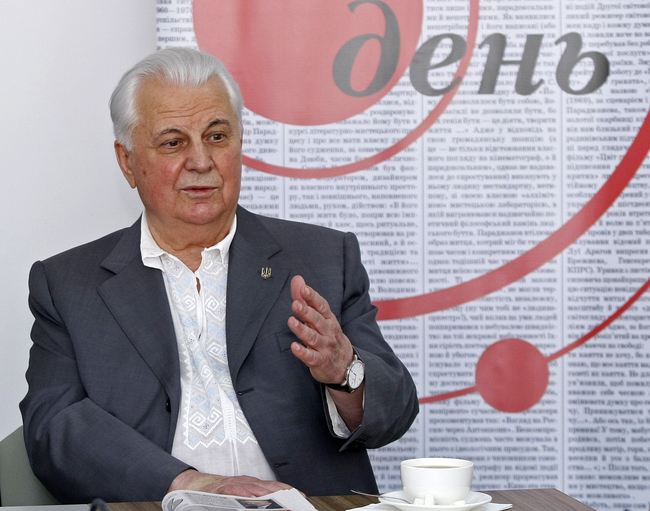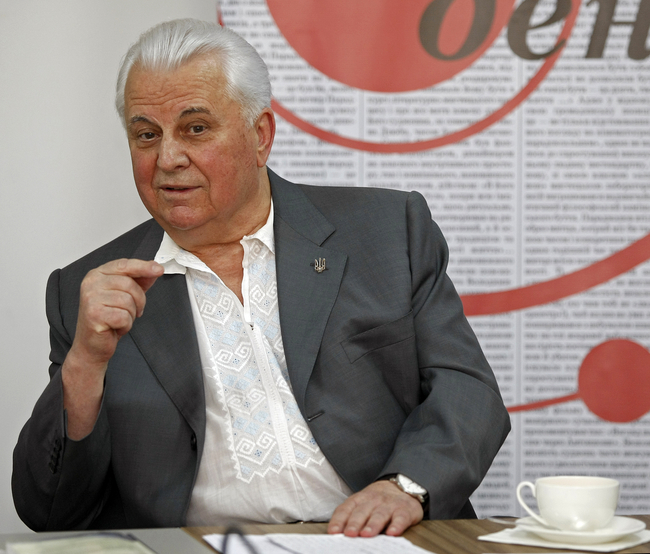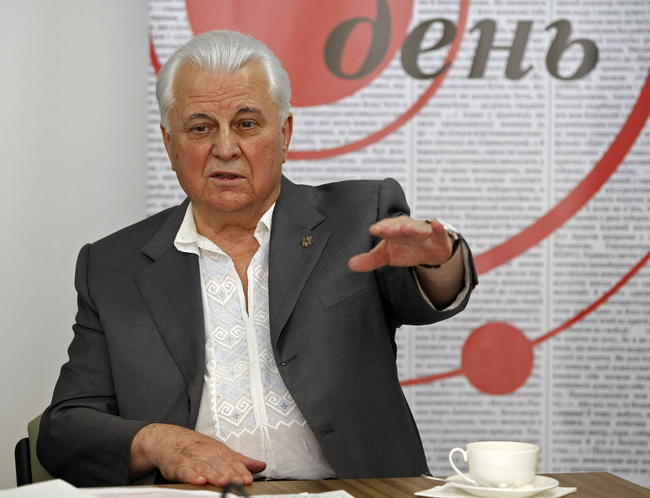Leonid Kravchuk [the first president of independent Ukraine. – Ed.] made mistakes, but he also took unprecedented steps. Here we are not just talking about the historic Belavezha Accords. Today it is hard to imagine that any member of the power elite would willingly take part in a re-election race. Kravchuk did and he lost. Ten years later, it became clear that the winner, Leonid Kuchma [the second president. – Ed.], was another loser. He helped the local oligarchs take root, combined efforts with the mobs, and let corruption loose on all possible levels. All this is proof that Ukraine failed to become a true nation state at the time. The enemy [i.e., Russia. – Ed.] took advantage of the situation and strengthened its position. What should the current Ukrainian administration do to keep the Ukrainian state effective?
MINSK PROCESS RELIEVES RUSSIA OF RESPONSIBILITY
Mr. Kravchuk, the war in the east of Ukraine is into its third year. The Minsk process is deadlocked. Apparently we need new initiatives, perhaps heuristic ones, to resolve the situation. Any ideas?

“Aristotle and Kant said that one must figure out the situation first and make conclusions afterward. The way we’re trying to figure out what’s happening doesn’t tally with reality. We keep hearing about ATO [the official Ukr. Acronym for “Anti-Terrorist Operation.” – Ed.]. This should imply a combat mission, or a series of measures carried out within a certain period of time. Ukraine is actually waging a war against Russia as the aggressor state with its hirelings. In wartime, all our actions, including the signing of [various] agreements, or the passing of [various] bills in parliament fit into the pattern. In other words, this matter should be cleared out legislatively in the first place. Number two. The Minsk process is obviously deadlocked. Its current status leaves no options for solving the main problem, stopping the war [in the east of Ukraine], reaffirming Ukraine’s territorial integrity, and reinstalling Ukrainian power in the liberated territories. I personally don’t believe that the talks in Minsk can secure any of this. The Minsk process has to be reset or upgraded. In the current format, Russia bears no legal responsibility [for what is happening in the east of Ukraine]. Moreover, it appears to act as Ukraine’s assistant in introducing proper order within the territories at issue. This is absurd. No constructive decisions can be made under the circumstances. Russia will keep using the Minsk process as a cover [for its aggression against Ukraine]. Russia has also convinced the West that the Minsk process will yield results for the settlement of the conflict.”
The Ukrainian side says there will be no progress without the Minsk process, that this is the only way to lift the sanctions imposed on Russia.
“Supposing that there is reason behind such statements and keeping the Minsk format, Ukraine should reiterate Russia’s responsibility for what’s happening. The international community should be convinced that the war [in the east of Ukraine] will continue unless [the Minsk agreements] are amended that way. There is also the issue of Crimea. We’re told that there is no alternative to the Minsk talks. In other words, a deadlock. There is no alternative to daytime and nighttime. There is always an alternative to an agreement... We’re involved in and with complicated military, political, and economic problems. New such problems appear to come out of the blue each time I watch the news channel. That’s precisely why our lawmakers must figure out and commit to paper Ukraine’s relationships with Russia, particularly with regard to the occupied territories. If Ukraine regards the Russian Federation as the aggressor state, appropriated decisions must be made on all official levels, ranging from Cabinet to President to Parliament. I, for one, can’t figure out the current relationships between Ukraine and Russia. Boris Yeltsin was a man you could talk to, and make deals with. I kept in touch with him and we made joint decisions. There are numerous examples of such decisions made in order to solve various problems, including that of the Black Sea Fleet. Vladimir Putin refuses to have official contact with Petro Poroshenko. The fact remains that Mr. Poroshenko was elected by the Ukrainian people, not by Mr. Putin. Mr. Poroshenko represents the people of Ukraine. In other words, Vladimir Putin refuses to hear the voice of the people of Ukraine. This situation can only be described as deadlocked.”
SOME IN THE WEST DON’T UNDERSTAND WHAT IS HAPPENING IN UKRAINE
This ambiguous official stand allows the aggressor room for maneuver and speculation. When the bill on the occupied territories became public knowledge, Russian media responded by alleging that Ukraine needed neither Crimea, nor Donbas...
“Russia will always take advantage of any situation and use disinformation. That’s why we should keep the people of Ukraine and the international community truthfully informed, that the territories [occupied by Russia] are part of Ukraine and must be returned to it. We can’t do so for as long as we turn away from the realities of [Russia’s] aggression, occupation, and thousands of deaths. The West doesn’t seem to understand [Ukraine’s] current stand. There are rules of international law that provide for Ukraine’s ATO and war, just as these rules provide for the consequences thereof. What I mean is that, should Ukraine prove that it is at war with Russia, the international community would respond in keeping with international law. Ukraine’s current official stand is best described as falling between two stools. If we say that ATO is underway, then we have to make it legit, make it clear that we’re fighting Kremlin-backed terrorists.”

What about Minsk II? We still can’t figure out this document. How could our political leadership sign this deadlock?
“Officially speaking, they did because Ukraine was facing a large-scale aggression it was unable to beat off at the time. It’s true that the Minsk talks forced Moscow to join the negotiating table. The problem was that Russia joined that table as a peacemaker, rather than aggressor. We were trapped in the haze of the Minsk agreements’ legalese, all those provisos that were worlds apart from realities, from our legislation and constitution.”
Any attempt to change the Minsk format or amend the agreements will be blocked by Russia, of course.
“That’s why we have to take steps the way they do in the West. We could ask the United States, Poland, UK, and other countries for help. Not all in the West actually understand what’s happening in Ukraine – I realized this after visiting Great Britain recently. Cambridge and other institutions and political organizations had questions about Ukraine that had to be answered loud and clear, otherwise Ukraine will find itself between the devil and the deep blue sea. We have to determine our stand.”
RUSSIA STARTED AGGRESSION AGAINST UKRAINE AFTER IT HAD BECOME DE FACTO INDEPENDENT
Russia tried to rock the boat in Ukraine, in the early 1990s, specifically in Crimea where the situation could become politically disastrous. How did Ukraine succeed in retaining its national independence and territorial integrity at the time? Why has the independent state of Ukraine lost Crimea and Donbas?
“I wouldn’t want to answer by saying that we were then smarter and more resourceful politically. The situation was different at the time. The Kremlin was too busy solving its problems and believed that Ukraine would toe the line. Russia started its aggression against Ukraine when it realized that Ukraine was winning national independence, de facto and de jure. There were rallies of protest and Maidans, including the Revolution of Dignity. There had appeared a new Ukrainian generation, but Ukraine lacked an adequate political leadership. Ukrainians took to the streets, demanding deeds, not words, but the president had fled his country. The Kremlin couldn’t miss this rare opportunity and Russian troops invaded Ukraine. That’s why Ukraine needs a strong administration with state-building issues topping the agenda, otherwise the Kremlin will plan another attempt on Ukraine.”

Was there any way to avoid the situation that developed?
“I’m sure that certain regions should’ve been given more economic and social liberties, rather than political freedoms. I mean what they’re trying to do by way of decentralization. They should’ve worked a clear cut action plan that would’ve ruled out any separatist speculations.”
This brings to mind what happened in Luhansk and Donetsk oblasts. They refused to take orders from Kyiv. Staring in the late 1990s, Russian and local oligarchs felt at home there. What about Ukraine’s inner integration?
“Russia capitalized on speculations concerning the alleged separateness of Ukrainians. But prior to this, the mechanisms of local self-government were not legally secured. This legal void allowed Kyiv to build relationships with the regions the way it wished. There was a rigid vertical financial command structure, but what you’ve just formulated as inner integration remained anyone’s guess. That vertical allowed certain [political] forces to discuss Kyiv as unwilling to allow the regions the freedoms they needed, with certain politicians capitalizing on the populace’s divided opinion on the usage of Ukrainian and Russian [considering that Ukrainian had been made the official language. – Ed.] and whining about the good old Soviet times.”
NATO MEMBERSHIP REFERENDUM
Don’t you think that there is clear and apparent danger to Ukraine and that it’s on an upward curve when each Ukrainian, watching a session of the Verkhovna Rada live, sees some MPs fighting as though in a bar brawl, then resuming their seats to press the yea/nay buttons to give posts to persons they know nothing about, but doing so because ordered to do so? Add here all those politicians during talk shows on a major national channel with their pro-Russian rhetoric, considering that our state is just trying to mature.
“I do, but the trouble is that not all of us appear to be learning from these lessons. Politicians can make all kinds of promises, but none will come true without agreeing on the top national priorities. Some of them don’t seem to realize that they will lose everything they have if worse comes to worst. The occupier [i.e., Russia] will spare no one, even those who are collaborating with him. There are numerous examples. As you know, I chair the NATO-Ukraine Commission. Mr. Yevhen Marchuk is also there. We’ve repeatedly proposed a NATO membership referendum and made every effort to have our initiative officially supported. The President of Ukraine appears to be procrastinating our initiative. He says it’s a good idea, but that this referendum should be organized later, when Ukraine is ready for it. I keep saying that, back at the time we signed the Belavezha Accords, we wouldn’t have signed any, had we waited for our countries to get ready for them. Everything must be done when the time comes. We’ve wasted so much time, we’re close to passing the point of no return, of losing the state of Ukraine. Back then, the people of Ukraine supported us with an absolute majority of votes [i.e., the proclamation of Ukraine’s national independence. – Ed.]. The same happened when the war broke out [in the east of Ukraine. – Ed.], when Ukrainians formed [volunteer] battalions and fought defend their homeland. There was a purpose and an enemy everyone saw and was determined to do one’s best to serve and defeat. I say let the people of Ukraine defend themselves, let them make their choice during a NATO membership referendum... This would a powerful convincing argument. Ukraine, in Russia’s eyes is just an unmarried daughter. If Ukraine marries Europe and NATO, then Russia, if you’ll pardon my saying so, will be in no position to put moves on her so brutally. As it is, Ukraine is vs. Russia all by itself.”

Talking of NATO, the President of Ukraine hasn’t mentioned the end goal, NATO membership, in the bill on domestic and external security. There is just the NATO criteria formula.
“This new law doesn’t even specify the aggressor, as though Ukraine has none, as though there is no war. Why didn’t they make it clear that Russia is the aggressor? The same applies to the NATO criteria. They should’ve made it clear that NATO membership is Ukraine’s goal.”
OLIGARCHS PREDOMINANT, UKRAINE’S TRAGEDY
Over 20 years back, you made an unprecedented decision and took part in a re-election race. At the time, portraits of your key rival Leonid Kuchma were displayed all over Luhansk, along with slogans about the equality of Ukrainian and Russian, and integration with Russia. What mistakes do you think our political leadership has made since then?
“They do not run this country, they represent the oligarchs and are oligarchs. Oligarchs are predominant in Ukraine and, given our absence of the rule of law, this is Ukraine’s tragedy. I have always stressed the need to separate political power from business, but the situation has been exactly the opposite, starting in the mid-1990s.”
Indeed, with the racket in between political power and business.
“Absolutely. Each could find his place in the sun, forming a horrible environment. Today, it’s hard to figure out what is most important for them – their own business or national interests. Could you picture Volodomyr Shcherbytsky [First Secretary of the Central Committee of the Communist Party of Ukraine (1972-89) – Ed.] as an oligarch? Of cause not. Now this is standard practice. In the West, a wealthy man operates in a totally different legal environment, being exposed to public control and that of pertinent agencies. Here no one would even dream of impeachment.”
Bad as the current regime may be, we know what happens after a country loses part of its territory, after the loss of the president. What should this president do to keep his post and his state ticking?
“The impression is that the people meant to run this country have no state-building experience; that they thought that governance was a piece of cake. Remember what President [Poroshenko] said about Ukraine winning the war in two weeks? I still hear some ‘upstairs’ say things that leave me wondering. How can such statements be made without knowing what’s really happening? Mr. Poroshenko should’ve realized that our army was weak at the time, that the Russian fifth column was everywhere in Ukraine. His statement can be regarded as either populist or ungrounded, misleading. The President should realize that his high post depends on how much confidence the electorate places in him. This requires deeds followed by words.”








